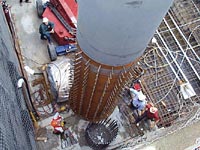Sustainable Infrastructure - SUSD0016
Faculty: Built Environment
School: Architecture Program
Course Outline: http://www.be.unsw.edu.au/
Campus: Sydney
Career: Postgraduate
Units of Credit: 6
EFTSL: 0.12500 (more info)
Indicative Contact Hours per Week: 3
CSS Contribution Charge: 2 (more info)
Tuition Fee: See Tuition Fee Schedule
Further Information: See Class Timetable
View course information for previous years.
Description
• Utilities – gas and electricity, water supply and sewerage, waste collection and disposal
• Public Works – roads and bridges, dams and canals, ports and airports, railways
• Community Facilities – prisons, schools, parks, recreation, hospitals, libraries
• Telecommunications - telephony, internet, television, satellites, cable, broadband, etc.
Public services in this context refers to public or social programs designed to benefit a class or classes of citizens, including health care, housing, workfare, education etc.This course prepares students to be proficient in a life-cycle method of infrastructure planning and management, which starts with a needs assessment, and encompasses programming, planning, design, costing, budgeting, financing, operations, maintenance, rehabilitation, replacement/redesign, and evaluation. We will also cover selected infrastructure and service systems, to be selected by the professor in consultation with the students, in order to best meet their interests. These typically include transport, public health, water, sewage treatment, energy, and telecoms. This course provides professionals and researchers with the theory and the tools needed to perform basic infrastructure planning and research. This course is designed to provide a basis for life-long inquiry into infrastructure. It is for students of urban planning, urban design, landscape architecture, architecture, property development, civil and environmental engineering, public health, and public administration.
Effective Semester 2/2016, students enrolled into SUSD0016 will receive training to become an accredited professional of Infrastructure Sustainability Council of Australia (ISCA) . The cost for this training will be included in the cost of the course (ie no additional cost). Students who successfully complete this course can become Accredited Professionals to perform sustainability assessments on infrastructure projects. Students can sit for the exam to become an Infrastructure Sustainability Accredited Professional (ISAP) by paying a discounted fee ($100). Students will also receive the IS Technical Manual as part of this training.










